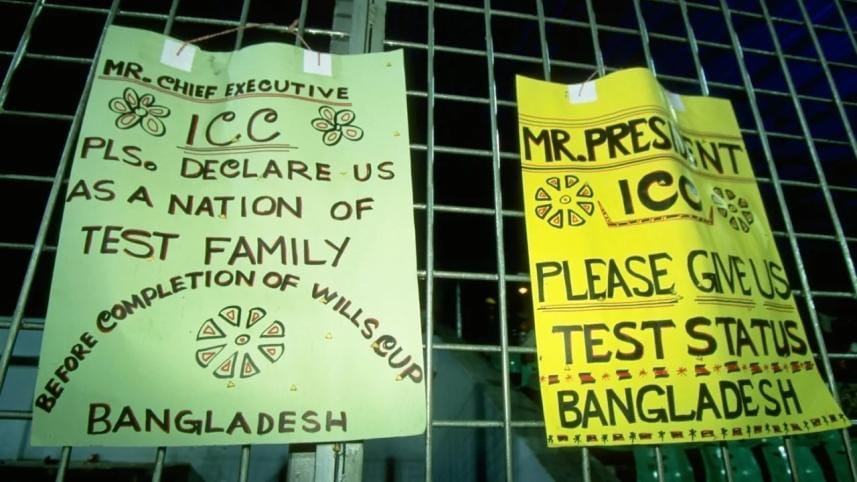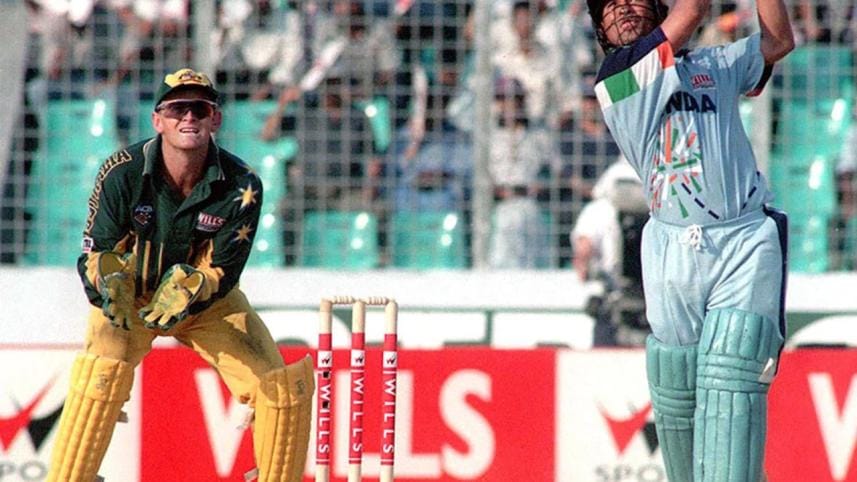A ‘Mini World Cup’ with big implications for Bangladesh

"Though the Bangladeshi team was not allowed to take part, the population reacted with enormous enthusiasm to the biggest sporting event -- some said the most positive event of any kind--in the country's short, fraught, history."
This is a line from the report, 'When cricket really was the winner' published in the 2000 edition of the Wisden Almanac about the 1998 Wills International Cup, better remembered as the 'Mini World Cup', and was the first iteration of what is now known as the ICC Champions Trophy.
Bangladesh hosting a global event does not seem that special right now, but back in 1998, the situation was quite different.
Things were looking up for Bangladesh when it came to on-field performances. The men's team had won the ICC Trophy the previous year, received ODI status in March of 1998 and were set to appear in their maiden ODI World Cup the following year in England.
The country's cricket administrators, players and even the fans had begun weaving the dream of attaining the coveted Test status and joining the big boys of cricket.
However, before formally appealing to the ICC for full membership, the Bangladesh Cricket Board (BCB), which in those days was called Bangladesh Cricket Control Board (BCCB), needed to prove its credibility as organisers and also give the world a glimpse of the country's potential as a cricketing hub.
And the perfect opportunity presented itself on a silver platter when the ICC named Dhaka as the venue for the Wills International Cup in October-November of 1998.
ICC's goal behind the new tournament was two-fold. Firstly, it wanted to raise funds for cricketing development and secondly, it wanted to spread the game in places it had never gone before. Perhaps that is why the ICC had initially wanted to stage the tournament in Disney World in Florida.
The likes of Mohammad Azharuddin and Brian Lara shaking hands with Donald Duck and Goofy before the toss or players sitting in the Mickey Mouse Clubhouse instead of their dressing room would have been pretty cool, but alas, those plans fell through.
The ICC then briefly considered staging it in Sharjah, a reliable cricket venue, before taking the plunge and naming Bangladesh as the host.

In October 1998, for the first time in cricket history, all nine Test-playing nations landed in a non-Test-playing country for an ICC tournament.
All teams checked into the same hotel - Pan Pacific Sonargaon-, played at the same venue – Bangabandhu National Stadium (BNS)-, and none of them had home advantage.
The format of the tournament was also unique. From start to last, it was a knockout tournament, meaning whoever lost a match was immediately eliminated.
The tournament began on October 24 with two bottom-ranked teams Zimbabwe and New Zealand playing a pre-qualifier, which the latter won to move on to the next phase.
Then the remaining eight teams played four quarter-finals, followed by the two semi-finals and the grand final between South Africa and West Indies on November 1.
In the space of just nine days, the BNS hosted the nine top cricket-playing teams in eight 50-over fixtures in front of packed crowds who were thrilled to see world-class cricketing action taking place in their backyard.
Given the grand reception of the fans, the glowing remarks of all participating players and the unequivocal approval of ICC officials, this tournament was a triumph for Bangladesh.
However, even weeks before the tournament, there were reservations about whether Bangladesh could host the tournament as half the country was submerged in the worst-ever flood in its recorded history.
The Eden Gardens in Kolkata was floated as a potential last-minute replacement venue. But the Bangladeshi organisers persevered and the tournament went ahead as planned.
The BCB, which was not the cash-rich sports body it is today, donated 10 per cent of the gate money from the event to the Prime Minister's Relief Fund for the flood victims, starting a tradition of helping the needy during national calamities, something the BCB, for all its shortcomings, still does.
South Africa emerged victorious in the final, winning their first and thus far the only ICC trophy in men's international cricket, and Jacques Kallis was named as the player of the tournament.
But the real winner of that tournament was Bangladesh as it showed the world that it was ready to host top-level cricket. And after the Tigers beat Scotland and stunned Pakistan in the 1999 World Cup, the BCB officials had the ammunition to really push for the Test status, which finally came on June 26, 2000.
Before drawing a conclusion, there was another interesting paragraph from that same Wisden article that seems worth mentioning.
"The real stars, though, were the population of Bangladesh. In villages without electricity, people huddled round radios listening to commentary, and kids began playing, Sri Lanka-style, with makeshift kit wherever there was a space. The moment Bangladesh gets a national team which does them credit, it will be cricket's boom country."
The Bangladeshi people still carry the same enthusiasm, but the wait for 'a national team which does them credit' is not over yet.



 For all latest news, follow The Daily Star's Google News channel.
For all latest news, follow The Daily Star's Google News channel.
Comments